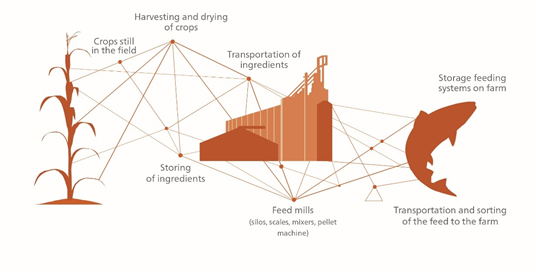Mycotoxins in Aquaculture
Mycotoxins are harmful, naturally occurring substances produced by certain molds (fungi). These fungi commonly grow on feedstuffs and multiply during adverse weather conditions. More than 500 mycotoxins have been identified to date, and this number is steadily increasing.
Mycotoxin risk in aquaculture
The aquafeed industry has made significant progress in developing sustainable fish feeds with the inclusion of plant-based protein alternatives. This increases the mycotoxin risk in aquaculture diets. Considering the long-term industry goal of reducing dependence on marine ingredients, we can expect much higher inclusion rates of plant-based raw materials in feeds, resulting in a greater challenge to mitigate the mycotoxin risk. It is vital to act now to get ahead of this potential issue.
Signs of mycotoxins and mycotoxin exposure pathways in aquaculture
Mycotoxin contamination is a “silent enemy” for producers since it is difficult to detect visibly. Long-term ingestion of feeds with low levels of mycotoxins or acute exposure to high levels might be a reason for the unexplained mortalities that are occasionally observed on fish farms.
Mycotoxin exposure pathways:

For more information on specific types of mycotoxins and related complications, visit knowmycotoxins.com/species/aqua.
Mycotoxin symptoms in aquaculture
Mycotoxin contamination and related effects on fish and shrimp health and performance can vary greatly between different mycotoxins and different cultured species. Noted problems from mycotoxin exposure in aquaculture species include:
- Reduced growth and decreased feed conversion rates
- Suppression of the immune system
- Increased susceptibility to opportunistic diseases
- Increased incidence of tumors and liver and kidney disease
Regardless of the type of toxin, reduced growth performance and high feed-conversion ratios are often associated with the ingestion of contaminated feeds. These lead to economic losses for fish producers.
Managing and preventing mycotoxins in aquaculture
Examining potential solutions at all critical points in the value chain, from fields to feed mills, is crucial. Growing resistant crop varieties, crop rotation, soil tillage and chemical and biological control of plant diseases are also recommended.
Detection, prevention and mitigation are critical for an effective mycotoxin strategy to avoid unpredictable losses and maintain a high-producing culture.
Alltech 37+® is a mycotoxin analysis test that allows producers to assess feed samples for over 50 different mycotoxins and receive a custom report to evaluate their current risk level. Utilizing this service from Alltech can provide producers a realistic picture of feed contaminants, which can speed up diagnosis, determine effective remediation and help form a more impactful mycotoxin control plan.
In addition, because it is so difficult to protect animals from mycotoxins, many producers use feed supplements designed to negate the effects of mycotoxins in the digestive tract and prevent them from being absorbed by the body.













